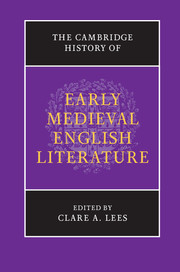Book contents
- Frontmatter
- Contents
- List of Illustrations
- List of Contributors
- Acknowledgements
- List of Abbreviations
- Introduction: literature in Britain and Ireland to 1150
- I WORD, SCRIPT AND IMAGE
- II EARLY ENGLISH LITERATURE
- 7 Across borders: Anglo-Saxon England and the Germanic world
- 8 English literature in the ninth century
- 9 The writing of history in the early Middle Ages: the Anglo-Saxon Chronicle in context
- 10 The literary languages of Old English: words, styles, voices
- 11 Old English poetic form: genre, style, prosody
- 12 Beowulf: a poem in our time
- 13 Old English lyrics: a poetics of experience
- 14 Literature in pieces: female sanctity and the relics of early women’s writing
- 15 Saintly lives: friendship, kinship, gender and sexuality
- 16 Sacred history and Old English religious poetry
- 17 Performing Christianity: liturgical and devotional writing
- 18 Riddles, wonder and responsiveness in Anglo-Saxon literature
- III LATIN LEARNING AND THE LITERARY VERNACULARS
- Bibliography
- Index of manuscripts
- Index
8 - English literature in the ninth century
from II - EARLY ENGLISH LITERATURE
Published online by Cambridge University Press: 05 February 2013
- Frontmatter
- Contents
- List of Illustrations
- List of Contributors
- Acknowledgements
- List of Abbreviations
- Introduction: literature in Britain and Ireland to 1150
- I WORD, SCRIPT AND IMAGE
- II EARLY ENGLISH LITERATURE
- 7 Across borders: Anglo-Saxon England and the Germanic world
- 8 English literature in the ninth century
- 9 The writing of history in the early Middle Ages: the Anglo-Saxon Chronicle in context
- 10 The literary languages of Old English: words, styles, voices
- 11 Old English poetic form: genre, style, prosody
- 12 Beowulf: a poem in our time
- 13 Old English lyrics: a poetics of experience
- 14 Literature in pieces: female sanctity and the relics of early women’s writing
- 15 Saintly lives: friendship, kinship, gender and sexuality
- 16 Sacred history and Old English religious poetry
- 17 Performing Christianity: liturgical and devotional writing
- 18 Riddles, wonder and responsiveness in Anglo-Saxon literature
- III LATIN LEARNING AND THE LITERARY VERNACULARS
- Bibliography
- Index of manuscripts
- Index
Summary
To a scholar working at the turn of the ninth century, the idea of composing vernacular prose works as part of a centrally planned learning programme would surely have seemed inconceivable. Seen in that context, the cultural transformation which made the large-scale production of literature in English an established tradition by the end of the century was truly remarkable. Over this period of time the linguistic boundaries defining the use of Latin and the vernacular were renegotiated, and English became accepted as a legitimate language for literary composition. It was the court of Alfred the Great which acted as the pivot for this cultural shift, with the king himself promoting and authorizing the practice of vernacular translation. But the literary and linguistic developments of the years before 871, nationally and internationally, were also highly significant in shaping the reinvigorated activity during Alfred’s reign. Moreover the ‘ninth century’, from a literary perspective, should not be seen as ending abruptly in 899: this is a notional construct which has emerged from the convenience of the date of Alfred’s death. The literary output traditionally associated with Alfred’s reign may perhaps be more usefully considered in terms of a ‘long ninth century’ extending beyond 900.
This chapter will trace the ways in which confidence in English developed and was manifested in the ninth century. It will argue that a combination of political, intellectual and spiritual imperatives, both within England and from the continent, underlay the emergence of a vernacular literary culture. It will examine the role of King Alfred and the West Saxon court in promoting ideas of translation and interpretation. The range and inventiveness of both the translations and original compositions will be explored. The strategies employed to invest these works with a validity which both reflects and is also distinct from that of Latin writings will be considered with particular attention to the idea of the king as author-translator.
- Type
- Chapter
- Information
- The Cambridge History of Early Medieval English Literature , pp. 209 - 231Publisher: Cambridge University PressPrint publication year: 2012
- 2
- Cited by

